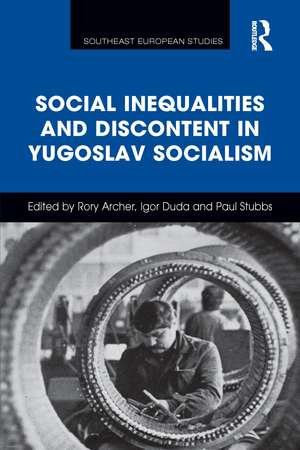Social Inequalities and Discontent in Yugoslav Socialism: Southeast European Studies
Editat de Rory Archer, Igor Duda, Paul Stubbsen Limba Engleză Paperback – 30 iun 2021
| Toate formatele și edițiile | Preț | Express |
|---|---|---|
| Paperback (1) | 383.68 lei 6-8 săpt. | |
| Taylor & Francis – 30 iun 2021 | 383.68 lei 6-8 săpt. | |
| Hardback (1) | 820.03 lei 6-8 săpt. | |
| Taylor & Francis – 15 apr 2016 | 820.03 lei 6-8 săpt. |
Din seria Southeast European Studies
-
 Preț: 312.22 lei
Preț: 312.22 lei -
 Preț: 489.26 lei
Preț: 489.26 lei - 9%
 Preț: 1039.73 lei
Preț: 1039.73 lei - 18%
 Preț: 1000.27 lei
Preț: 1000.27 lei - 18%
 Preț: 994.95 lei
Preț: 994.95 lei - 12%
 Preț: 312.43 lei
Preț: 312.43 lei - 30%
 Preț: 849.05 lei
Preț: 849.05 lei -
 Preț: 383.12 lei
Preț: 383.12 lei - 19%
 Preț: 241.15 lei
Preț: 241.15 lei -
 Preț: 351.66 lei
Preț: 351.66 lei -
 Preț: 383.12 lei
Preț: 383.12 lei -
 Preț: 379.77 lei
Preț: 379.77 lei -
 Preț: 384.86 lei
Preț: 384.86 lei - 18%
 Preț: 1006.92 lei
Preț: 1006.92 lei - 28%
 Preț: 821.29 lei
Preț: 821.29 lei -
 Preț: 381.98 lei
Preț: 381.98 lei -
 Preț: 385.84 lei
Preț: 385.84 lei -
 Preț: 411.42 lei
Preț: 411.42 lei -
 Preț: 385.62 lei
Preț: 385.62 lei - 26%
 Preț: 764.69 lei
Preț: 764.69 lei -
 Preț: 381.43 lei
Preț: 381.43 lei - 26%
 Preț: 764.20 lei
Preț: 764.20 lei -
 Preț: 361.13 lei
Preț: 361.13 lei - 18%
 Preț: 999.19 lei
Preț: 999.19 lei -
 Preț: 382.54 lei
Preț: 382.54 lei - 17%
 Preț: 241.15 lei
Preț: 241.15 lei - 17%
 Preț: 241.15 lei
Preț: 241.15 lei - 31%
 Preț: 767.67 lei
Preț: 767.67 lei -
 Preț: 469.34 lei
Preț: 469.34 lei - 18%
 Preț: 1000.45 lei
Preț: 1000.45 lei
Preț: 383.68 lei
Nou
Puncte Express: 576
Preț estimativ în valută:
73.43€ • 76.38$ • 60.62£
73.43€ • 76.38$ • 60.62£
Carte tipărită la comandă
Livrare economică 14-28 aprilie
Preluare comenzi: 021 569.72.76
Specificații
ISBN-13: 9781032097954
ISBN-10: 1032097957
Pagini: 210
Dimensiuni: 156 x 234 x 11 mm
Greutate: 0.31 kg
Ediția:1
Editura: Taylor & Francis
Colecția Routledge
Seria Southeast European Studies
Locul publicării:Oxford, United Kingdom
ISBN-10: 1032097957
Pagini: 210
Dimensiuni: 156 x 234 x 11 mm
Greutate: 0.31 kg
Ediția:1
Editura: Taylor & Francis
Colecția Routledge
Seria Southeast European Studies
Locul publicării:Oxford, United Kingdom
Cuprins
Contents: Bringing class back in: an introduction, Rory Archer, Igor Duda and Paul Stubbs; What nationalism has buried: Yugoslav social scientists on the crisis, grassroots powerlessness and Yugoslavism, Ana Dević; The gastarbajteri as a transnational Yugoslav working class, Brigitte Le Normand; ‘Paid for by the workers, occupied by the bureaucrats’: housing inequalities in 1980s Belgrade, Rory Archer; Education, conflict, and class reproduction in socialist Yugoslavia, Jana Bacevic; Roma between ethnic group and an ‘underclass’ as portrayed through newspaper discourses in socialist Slovenia, Julija Sardelić; Of social inequalities in a socialist society. the creation of a rural underclass in Yugoslav Kosovo, Isabel Ströhle; ‘They came as workers and left as Serbs’: the role of Rakovica’s blue-collar workers in Serbian social mobilizations of the late 1980s, Goran Musić; ‘Buy me a silk skirt mile!’ Celebrity culture, gender and social positioning in socialist Yugoslavia, Ana Hofman and Polona Sitar; When capitalism and socialism get along best. Tourism, consumer culture and the idea of progress in Malo Misto, Igor Duda. Index.
Notă biografică
Rory Archer is a PhD candidate in History at the University of Graz where he works as a researcher at the Centre for Southeast European Studies. Igor Duda is Assistant Professor at the Juraj Dobrila University of Pula, where he teaches at the Department of Humanities and works as a researcher at the Centre for Cultural and Historical Research of Socialism. Paul Stubbs is a Senior Research Fellow at The Institute of Economics, Zagreb, Croatia.
Recenzii
'...the volume presents valuable new insights and manages to make a forceful argument for a new research agenda: we need to take the social more seriously when explaining how Yugoslavia worked (and how it failed).'
Ulf Brunnbauer
Leibniz Institute for East and Southeast European Studies, Regensburg, Germany
Southeastern Europe 42 (2018)
’This book promises to reopen understandings of power, class and crisis in the Yugoslav region. The topics and people at its centre were not just marginalised in material terms but have also often been bypassed in explanations for the break-up of Yugoslavia. Every chapter shares in the purpose of renewing historians' agendas for interpreting Yugoslav socialism and its collapse.’ Catherine Baker, University of Hull, UK
Ulf Brunnbauer
Leibniz Institute for East and Southeast European Studies, Regensburg, Germany
Southeastern Europe 42 (2018)
’This book promises to reopen understandings of power, class and crisis in the Yugoslav region. The topics and people at its centre were not just marginalised in material terms but have also often been bypassed in explanations for the break-up of Yugoslavia. Every chapter shares in the purpose of renewing historians' agendas for interpreting Yugoslav socialism and its collapse.’ Catherine Baker, University of Hull, UK
Descriere
Through case studies from a range of social millieux, contributors to this volume seek to 'bring class back in' to Yugoslav historiography, exploring how theorisations of social class informed the politics and policies of social mobility and conversely, how societal or grassroots understandings of class have influenced politics and policy. Rather t
